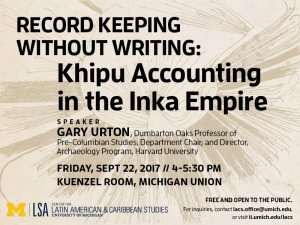Presented By: Center for Latin American and Caribbean Studies
LACS Lecture. Record Keeping Without Writing: Khipu Accounting in the Inka Empire
Gary Urton, Harvard University

The Inka recording device, the khipu (Quechua: “knot”) has been the subject of intense interest and study through the 20th century and down to the present day. Early colonial Spanish observers of record keeping and accounting by former Inka administrators testified that khipus were used to register data of interest to the state (e.g., census and tribute records) as well as narrative-type accounts, such as histories, songs, and poems. Researchers have determined how to decipher the quantitative information in Inka administrative records, but little progress has been made to date deciphering the narrative khipus. This presentation provides an overview of what is currently known about khipu record keeping in Tawantinsuyu – the Inka Empire – with special attention to recent discoveries at the archaeological site of Inkawasi, on the south coast of Peru.
Gary Urton is Dumbarton Oaks Professor of Pre-Columbian Studies in the Department of Anthropology at Harvard. He earned his M.A. in Ancient History and his Ph.D. in Anthropology at the University of Illinois, Champaign-Urbana. His research focuses on a variety of topics in pre-Columbian and early colonial Andean cultural and intellectual history, drawing on materials and methods in archaeology, ethnohistory, and ethnology. He is the author of many articles and of numerous books and edited volumes on Andean/Quechua cultures and Inka civilization. His books include: At the Crossroads of the Earth and the Sky (1981), The History of a Myth (1990), The Social Life of Numbers (1997), Inca Myths (1999), and Signs of the Inka Khipu (2003). A former MacArthur Fellow (2001-2005) recipient of a Guggenheim Fellowship in 2014-15, Urton is the Founder/Director of the Harvard Khipu Database Project, which seeks to decode the Inka recording device, the khipu (or quipu). He is currently at work analyzing a collection of khipus recently excavated at an Inka storage facility at the site of Inkawasi, on the south coast of Peru.
Gary Urton is Dumbarton Oaks Professor of Pre-Columbian Studies in the Department of Anthropology at Harvard. He earned his M.A. in Ancient History and his Ph.D. in Anthropology at the University of Illinois, Champaign-Urbana. His research focuses on a variety of topics in pre-Columbian and early colonial Andean cultural and intellectual history, drawing on materials and methods in archaeology, ethnohistory, and ethnology. He is the author of many articles and of numerous books and edited volumes on Andean/Quechua cultures and Inka civilization. His books include: At the Crossroads of the Earth and the Sky (1981), The History of a Myth (1990), The Social Life of Numbers (1997), Inca Myths (1999), and Signs of the Inka Khipu (2003). A former MacArthur Fellow (2001-2005) recipient of a Guggenheim Fellowship in 2014-15, Urton is the Founder/Director of the Harvard Khipu Database Project, which seeks to decode the Inka recording device, the khipu (or quipu). He is currently at work analyzing a collection of khipus recently excavated at an Inka storage facility at the site of Inkawasi, on the south coast of Peru.